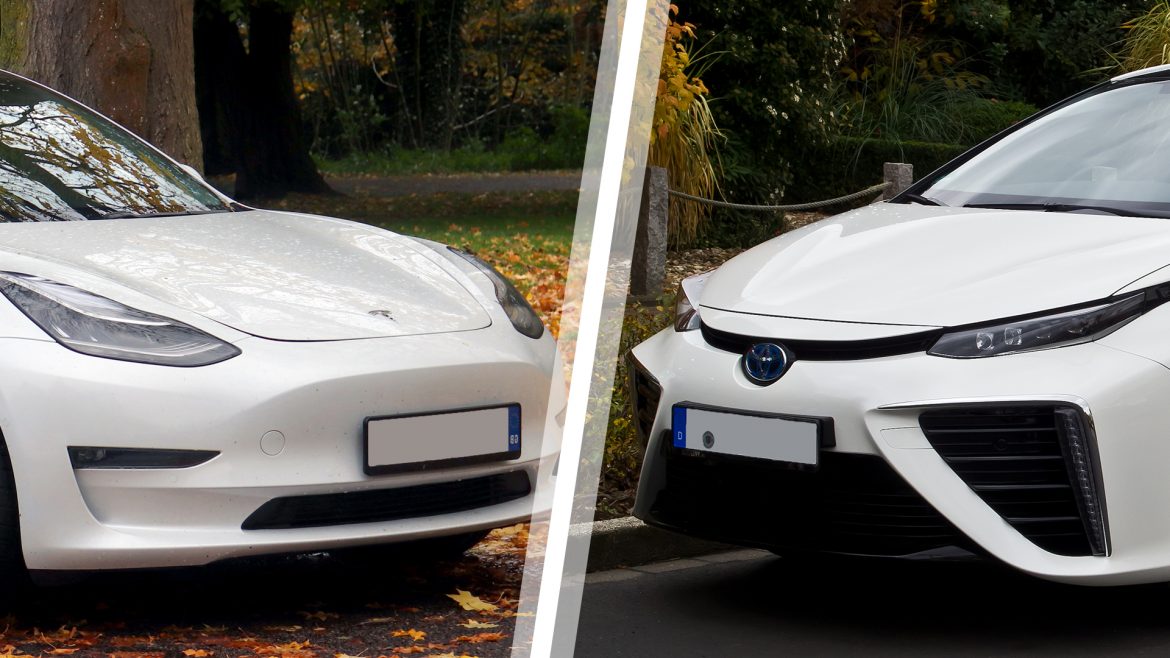While we all are praising the advancements in the electric car industry, hydrogen fuel cells have been placed on the back burner. Up until the recent success of the BEV, Hydrogen fuel cells were considered the future fuel of the automotive sector.
The sales of electric cars are at a peak these days as more and more automotive brands are jumping into electric car production. If we compare, at face value, both options on the grounds of technology, controversially, hydrogen fuel cells are labeled as the better choice. Let’s have a look at both hydrogen fuel cells and electric cars and what the future holds for the automotive market.
What is a Hydrogen Fuel Cell Car?
Before beginning this debate, let’s understand the workings of hydrogen fuel cell cars, and how these cars are powered. FCEV’s use the chemical reaction between hydrogen and carbon to power the vehicle, and the battery-packed cars produce water and energy as a result. Both BEV’s and FCEV’s will have a similar sized battery with their efficiencies drastically different.
For the purists, FCEV’s have exhaust pipes just like traditional vehicles, but instead of the harmful smoke, they emit only the water droplets. Do you miss they refueling experience at the gas pumps? Well, hydrogen fuel cell cars also need refueling, but you need to fuel these cars with hydrogen instead of petrol or diesel.
Battery Electric Vehicles
The demand for conventional fully electric cars is at a peak these days. With the announcement of the Tesla Cybertruck, Model Y, and just about every car manufacturer boasting their upcoming electric cars, the number of electric cars on the road is expected to drastically increase in the next few years.
These vehicles use traditional charge storage methods, just like our smartphones and laptops. Just plug it in, go to bed, and wake up with a full battery. Charging a Tesla is easier than most would imagine.
The latest technologies in the EV industry even convert brake friction to energy used to recharge the car. Some cars like the Fisker Ocean even opt to use solar panel car roofs to recharge their batteries.
Hydrogen Fuel Cell vs. Electric Cars
From the use of technologies to the range per charge, both vehicles offer pros and cons that can affect your buying decision. Here are some points that you need to consider for both options:
| Hydrogen Fuel Cell Vehicles | Electric Vehicles | Petrol or Diesel Vehicles | |
|---|---|---|---|
| Starting Price | €60,000 | €21,000 | €8,000 |
| Max Range | 200-250 miles | 50-390 miles | 300-400 miles |
| Full Refueling Time | 3-4 minutes | 2-12 hours | 2-3 minutes |
Why is there no hype for Hydrogen Fuel Cell Vehicles?
The electric car manufacturers have taken the lead by capturing the largest portion in the automotive manufacturing sector. From the weight of the batteries to the time required for the refueling of the batteries, the hydrogen fuel cells outweigh electric cars. The hydrogen fuel cell vehicles are perfect for daily commuters and public transport if the manufacturers take an interest.
However, this would require adding massive infrastructure changes and converting previous petrol stations to hydrogen fuel stations. Meanwhile traditional electric cars can be charged from the comfort of your own home.
Hydrogen is also much more expensive than both electricity and traditional fuel sources. The currently available hydrogen fuel cell vehicles also cost much more than the standard EV. Additionally, electric cars also end up more efficient when compared to today’s hydrogen vehicles. Still, companies are working on improving the hydrogen extraction methods to beat out electric cars.
Which vehicle is best for you in 2020?
The decision of buying an electric over a hydrogen fuel cell car can depend upon some key factors like:
- Performance of the vehicle
- Range per charge
- Availability of the charging units
- Price of the vehicle
On paper, hydrogen fuel cell vehicles could beat out electric cars but there’s much more to it. Electric cars win by far in terms of price, availability, and charging infrastructure.
Toyota, Hyundai, and Honda are all already working on improving the manufacturing process of hydrogen fuel cell cars. Still, these vehicles will need a lot of marketing efforts in order to build trust and make a name for themselves in this new era. For now, the clear winner is Tesla and all of the manufacturers following suit.
